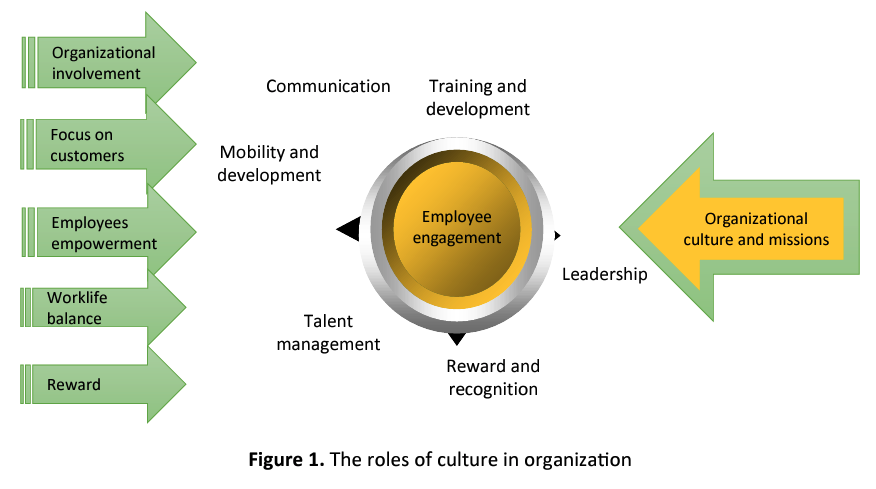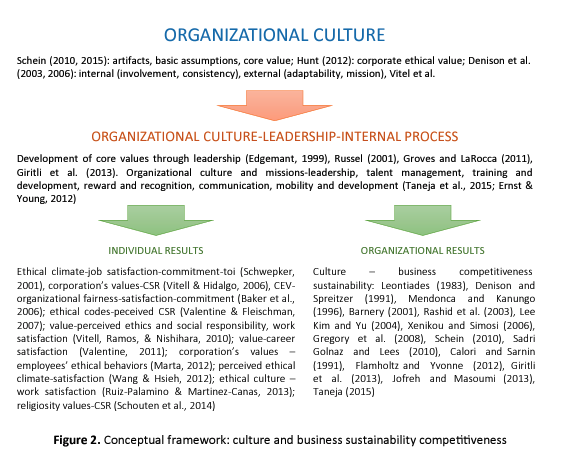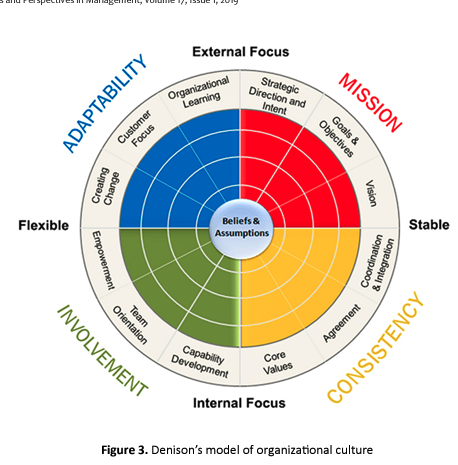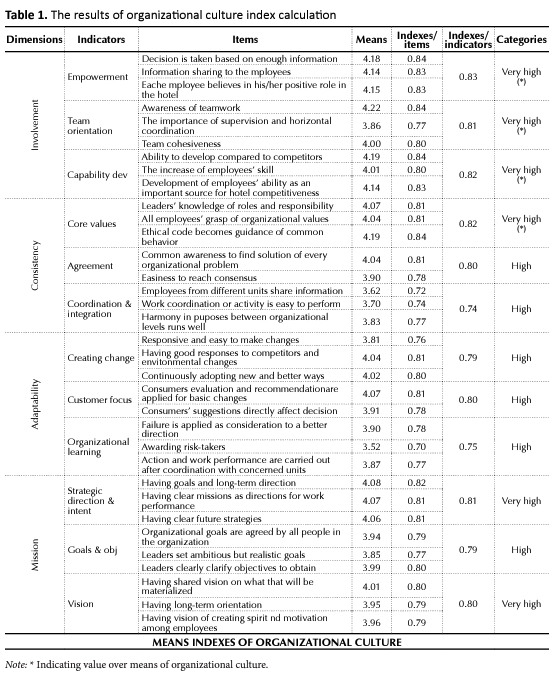Analysis of organizational culture with denison’s model approach for international business competitiveness


Published: March 1, 2019
Latest article update: Dec. 12, 2022
Abstract
This paper is mainly to study implementation of organizational culture in enhancing business competitiveness. Culture is seen as a soft system tool that reflects beliefs that are able to drive business performance in an international environment. Today, culture is a part of instrument to measure organizational readiness in managing business in an international environment. The research is focused on evaluatiny organizational culture in international-scale hotel in Yogyakarta, Indonesia. International-scale hotels are faced with differences in the nature of employees and customers, so management needs to develop a culture type as a strategy to encourage business competitiveness. T he research applies Denison’s organizational culture model with four dimensions: involvement, consistency, adaptability, and mission. Sample includes 248 working people at four star hotels with various positions, that is managers, supervisors and employees. The results of the study found that international hotel chains have the power to carry out internal alignment as a strategy to increase competitiveness through employee empowerment programs, team orientation, skills development, and alignment of work values. The results of the study illustrate the importance of internal and external dimension consistency for international business competitiveness
Keywords
International chain management, Denison’s model, business competitiveness
INTRODUCTION
Previous research has concluded on the importance of organizational culture for business success (Denison & Spreitzer, 1991; Calori & Sarnin, 1991; Denison & Mishra, 1995; Fey & Denison, 2003; Rashid et al., 2003; Denison & Haaland, 2004; LeeKim & Yu, 2004; Xenikou & Simosi, 2006; Sadri & Lees, 2011; Jofreh & Masoumi, 2013). However, there is no universally accepted instrument for measurement of organizational culture. Previous research used different instruments to measure organizational culture in several countries. Sempan et al. (2002) apply Organizational Culture Questionnaire (OCQ) instrument to measure the effect of organizational culture on employees’ work satisfaction in Africa. Egan et al. (2004) explore organizational culture at US informational technology corporation by applying a questionnaire of Organizational Learning Culture. Kokina and Ostrovska (2013) apply Denison’s model in exploring the effect of organizational culture at corporations in America. In Indonesia, Pawirosumarto et al. (2017) analyze organizational culture covering two types of organizational culture, that is dominant culture and subculture. Al-Sada et al. (2017) explore organizational culture in Qatar by means of Organizational Culture Instrument (OCI), while Kumar
et al. (2017) apply Stakeholders’ Culture Framework to explore cultural values implementation at 530 corporations in Japan, US, and Italy. Its dimensions cover morale orientation, stakeholders relevance, stakeholders’ rights, and morale philosophy.
A strong organizational culture becomes behavioral standards based on ethical values that allow for the engenderment of sense of identity and positive attitude among members. For business organization managed by international chain, evaluation of organizational culture is considered essential as it is related to capability for acculturation between countries. Management is faced with the need to manage diversity of employees to resulting good services for cross-country consumers. Organizational culture as a shared identity and glue between members serves to cushion any differences in attitudes, values, behaviors derived from varied cultural backgrounds.
Fey and Denison (2003) hold that culture is a complex phenomenon covering belief, basic assumption, aspects forming external structure and visible business practices. Some cultural experts still question if organizational culture is “measureable”, by being comparable.
The fit of organizational culture allows for enhancing business effectivity (Denison & Spreitzer, 1991; Denisson & Mishra, 1995; Fey & Denison, 2003; Denison et al., 2004). It is predicted to have a positive effect on capability for external adaptation and internal harmonythat makes corporation effectivity possible. The relationship is supported by several organizational culture scholars such as Rashid et al. (2003), LeeKim and Yu (2004), Xenikou and Simosi (2006) who consider that corporation culture is related to business performance. Gregory et al. (2008) also argue that a strong organizational culture would drive for business effectivity and employees’ positive attitudes.
The present research intends to evaluate organizational culture implementation in international-class hotel business run under international chain management system. Denison’s model is chosen for this research to describe the roles of internal and external harmony of organizational culture in supporting business competitiveness.
1. LITERATURE REVIEW
1.1. The importance of organizational culture for business competitiveness
Within organizational context, the concept of culture is important to society and organization. Culture is organizational instrument that can strengthen business mission, describe values organizational founders want to instill and influence decision making and business strategy (Taneja, 2015). The existence of organizational culture would affect policy and system of human resources management as presented on Figure 1 that would lead to employees attachment and business competitiveness.
The significant role of culture is reflected of many works examining cultural aspects and valuable organization outcomes. Hunt et al. (1989) suggest strong positive association between corporate ethical values as a major dimension of corporate culture (Schein, 1985) and organizational commitment in marketing. Organization need concern to instill and maintain a high level of loyalty in their employees may have to be more than just task directors of their organizations.
The role of organizational culture on business success is clarified by Calori and Sarnin (1991), Linnenluecke and Griffiths (2009), Sadri and Lees (2001), Klein (2011), Flamholtz and Yvonne (2012), Jofreh and Masoumi (2013), Vitel et al. (2009). Organizational culture plays an important role in the success of business unit, and there has been ample evidence of positive correlation between organizational performance and organizational culture. Most Japanese corporations obtain success through organizational culture development and subsequent employees’ commitment (Jofreh & Masoumi, 2013).

Culture makes up of basic values, beliefs, and principles that lay grounds for organizational management system, and a set of management practices and behavior that become precedence for later behaviors (Denison & Spreitzer, 1991). Denison et al. (2003) put forward an organizational culture model with its effect on business effec- tivity. In this model, Denison addresses internal and external factors. Organizations with market focus and opportunistic nature often have problems with internal integration. On the other hand, organizations with capability of integration and control might have difficulty in adaptating to their environments. Organizations with top-down vision often find trouble in focus on empowerment and “bottom-up” movement, while organizations driving for wide participation often find difficulty in determining direction. The effective organizations are those that are able to settle these contradictions without relying on a simple trade-off.
Denison’s organizational culture has been tested with sample of top executives from 764 organizations (Denison & Mishra, 1995) that have different cultural characteristics to find their effects on effectivity criteria. Profitabilily is more correlated with “typical mission” and “consistence”. Organizational innovation is correlated with “involvement” and “adaptation ability”, and selling growth is found to have the strongest correlation with “adaptation” and “mission”.
1.2. Conceptual framework
Business competitiveness requires the right organizational culture development (Alchian & Demsetz, 1972; Barney, 2001; Leontiades, 1983; Schein, 2010; Taneja et al., 2015). Edgemant (1999) argues that successful business entails value development that can uplift work satisfaction (Valentine & Fleischman, 2007; Valentine et al., 2011) and employees’ positive attitude and behavior.
Organizational culture is soft system tool that can be business strategy and affects organizational decision-making such as leadership development, human resources program development, and other policies. Organizational with the right cultural support would gain positive benefit in the forms of positive employees’ attitude, perception, ethical behavior, business ethics, career satisfaction, work satisfaction, and employee engagement. These positive benefit surely would strengthen organizational performance and business competitiveness in the long term. Based of previous research, the relationship between culture, individual outcome, and organizational outcome (sustainability, competitiveness) is presented in Figure 2.
In hotel business, employees play important role. Interaction in providing services to hotel guests from various countries is determined by staff’s service performance and a set of supporting system. A strong organizational culture is reflected by vision congruence, the existence of order principles, team work, employees’ creativity, innovation, empowerment, alignment between parts, the same direction and purpose, highco- ordination and integration, employee development conforming to business’ needs (Denison et al., 2006). These characteristics are essential in service delivery of international-class hotels.

2. RESEARCH METHODS
This research used Denison’s organizational culture model as a method of evaluating organizational culture of business international hotel managed by international chain management, as presented in Figure 3. The model covers internal dimension: involvement and consistency and external dimension: adaptability and mission. Involvement is measured by: empowering people, building teams, and developing employees’ ability at all levels in an organization. Involvement measured by three indexes: empowerment, team orientation, and capability development. Consistency is characterized by core values, agreement, coordination and integration.
Adaptability measures organization capability to adapt itself to consumers’ needs, to take risks, to learn from mistakes, and to make changes. It is measured by three indexes: creating change, consumer focus, and organizational learning. Mission describes ability to express future vision, measured by three indexes: strategic direction and intent, goals and objectives, and business vision.
2.1. Sample and procedure
The study displays descriptive results of organizational culture implementation with Denison’s model for hotel business managed by international chain management. In materializing internal consistency and external adaptation. Data were collected from 248 working employees in international chain hotel with positions as managers, supervisors, and staff, especially Daerah Istimewa Yogyakarta, is known as the city of tourism, education, and culture.

2.2. Instrument
Organizational culture is expressed as basic values, beliefs, and principles that guide organizational management system and a set of management practices and behaviors that serves as good exem- plaries and strengthen basic principles. This study uses organizational culture instrument consists of 36 questions based on Denison’s organizational culture that develop from internal dimensions and external dimension as shown in Table 1.
It performs validity and reliability tests to make sure of research instrument quality, by involving 33 employees of The West Lake Resort, Yogyakarta.
The result confirmsvalidity and reliability of the questionnaire. Validity value is fulfilled at under 5% significance level. Reliability value with Cronbach Alpha technique hits 0.849, which falls under high category.
2.3. Analytical measures
The research applies Denison’s organizational culture model as the way to measure culture implementation, with stages of measures as follows:
- testing research’s instrument quality on different respondents, that is hotel employees with almost similar works;
- making descriptive analysis on all aspects of organizational culture;
- calculating organizational culture index;
- analyzing organizational culture implementation.
3. RESULTS
Analytical results on four international-class hotel with international chain management system are presented in Table 1.
The instrument of ОС adapted from Denison (2006).
The research indicating description of organizational culture in international chain hotel can be presented in Figure 4.
Table 1 and Figure 4 demonstrate that average value of organizational culture index is 79. It means that employees observe that organization has a strong organizational culture. Furthermore, it shows that organizational culture in hotel has been socialized and well implemented. Involvement, consistency, adaptability, and mission dimensions are evaluated to be over organizational culture, informing conditions as follows:
- hotel management has communicated, socialized and implemented hotel’s value system consistently as behavioral standards in providing services to hotel guests;
- hotel management has successfully performed empowerment through trust, work team, supervision, and employees’ capability development;
- organization has successfully implanted its values and ethical code, employees have performed their works according to guidelines, role assignment, and clear responsibilities accompanied with ethical code and work values;
- inter-section coordination and integration in international-scale hotel of Yogyakarta is not compatible to organizational culture model.

4. DISCUSSION
International category edifice with international chain management system in Yogyakarta emphasizes internal strength in structure culture, light authorization, team orientation, employee’s capability development, work values and customary harmony. Even so hotel management also prioritizes external aspects, especially in its capability to build future vision, efforts to achieve strategical or long-term objectives, and special attention to customers. It is because the hotel is international class with clear governance, detailed work procedure, and agreed-upon work values that guide work performance.
Hotel management has made harmony that affects work motivation. It has highlighted good hotel service prioritizing consumer service. Management has a clear future plan reflected in organizational vision, strategical planning, and long-term objectives.
To increase business competitiveness, hotel management needs to focus on organizational change and development tailored to hotel guest needs. By
this way, organizational culture can reach balance internally and externally. Denison holds that an ideal organizational culture reflects balanced internal and external focus that might lead to effective business strategy and performance.
5. IMPLICATIONS, LIMITATIONS, AND SUGGESTIONS
Denison’s organizational culture model can be applied to evaluate management approach and might serve as a measure of business competitiveness. Hotel business managed by international chain management is more equipped to make adaptation on its changing environment. It also has a good capability to align internal factors indicated by ability to increase employees’ empowerment, their capacity development, organizational culture values entrenchment, teamwork development, and common understanding among them. Management needs to take account of increased organizational learning capability, coordination, and integration.
The present research proves that Denison’s organizational culture model can be applied as an instrument to measure organizational culture in hotel business. Empirically this research finds theoretical model of organizational culture in international class hotel business, especially under international chain hotel management. It means that business effectivity can result from organizational culture with internal and external factors. The organizational culture model covers involvement, mission, consistency, and adaptability.
Furthermore, this study indicates that international scale-hotel business in Yogyakarta puts emphasis on internal, prioritizing empowerment, team orientation, capability development, core values, and agreement components. Nevertheless, hotel business is also concerned with external factors such as customer focus, strategic direction, and vision. Among these cultural components, empowerment is a dominant culture. High employee empowerment is compatible to management support for increased employees’ capability and encouragement for teamwork. It is related to hotel business characteristics that put employees as vanguard for good services to hotel guests. High employee involvement that determines hotel service performance is affected by work value congruence that can increase hotel competitiveness.
This result shows the importance of organizational culture to enhancing business competitiveness, especially hotel business by international management chain. Hotel management need to align internal and external factor of organizational culture as a strategy to increase business’ long-term competitiveness. However, this research has limitations. The model applied in this reseach excludes other variables that are antecedents and consequence of organizational culture. Future research on organizational culture should pay attention to the antecedents and consequences, such as leadership, satisfaction, performance, or profitability.
REFERENCES
- Al-sada, M., Al-esmael, B., & Faisal, M. N. (2017). Influence of structure Culture and Leadership vogue on worker Satisfaction, Commitment and Motivation within the academic Sector in Qatar. EuroMed Journal of Business, 12(2), 163-188.
- Baker, Hunt, Andrews (2006). Promoting moral Behavior and structure Citizenship Behaviors. Journal of Business Research, 59, 849-857.
- Barney, J. B. (2001). Is Resource-based read a “Useful” Perspective for Strategic Management Research? Yes. Academy of Management Review, 26(1), 41-56.
- Calori, R., & Sarnin, P. (1991). Corporate Culture and Economic Performance: a French Study. Organization Studies, 12(1), 49-74.
- Denison & Mishra (1995). Toward Theory of structure Culture and Effectiveness. Organization Science, 6(2), 204-223.
- Denison & Spreitzer, G. M. (1991). Organizational Culture and structure Development: a competitory Values Approach, analysis In structure amendment and Development, 1 sd 21.
- Denison, D. R., Haaland, S., & Goelzer P. (2003). Corporate Culture and structure Is Asia completely different From the remainder of the globe? Organizational Dynamics, 33(1), 98-109.
- Denison, D., Janovics, J., & Young, J. (2006). Diagnosing Organizational Cultures: Validating a Model and Method. International Institute for Management Development, 1-39.
- Edgemant, R. L. (1999). Systematic Leadership Via Core Value Deployment. The Leadership And Development Journal, 20(2), 94-98.
- Egan, T. M., Yang, B., & Bartlett, K. R. (2004). The Effects of structure Learning Culture and Job Satisfaction on Motivation to Transfer Learning and Turnover Intention. Human Resource Development Quarterly, 15(3), 279-301.
- Ernst & Young (2012). Integrated annual review. Nederland.
- Fey, C. F., & Denison, D. R. (2003). Organizational Culture and Effectiveness: will yankee Theory Be Applied in Russia? (William Institute Working Paper, 45 p.).
- Flamholtz, E. G., & Yvonne, R. (2012). Corporate Culture, Business Models, Competitive Advantage, Strategic Assets and The Bottom Line Theoretical and Measurement Issues. Journal of Human Resource Costing & Accounting, 16(2), 76-94.
- Giritli, H., Oney-Yazici, E., Topcu-Oraz, G., & Acar, E. (2010). The Interplay between Leadership and Organizational Culture in the Turkish Construction Sector. International Journal of Project Management, 31, 228-238.
- Gregory, B. T., Harris, S. G., & Armenakis, A. A. (2008). Organizational Culture and Effectiveness: A Study of Values, Attitudes, and Organizational Outcomes. Journal of Business Research, 62(7), 673-679.
- Groves, K. S., & LaRocca, M. A. (2011). An Empirical Study of Leader Ethical Values, Transformational and Transactional Leadership, and Follower Attitudes Toward Corporate Social Responsibility. Jurnal of Business Ethics, 103(4), 511-528.
- Hunt, S. D. et al. (2012). Corporate moral Values and structure Commitment In selling. Journal of Marketing, 53(3), 79-90.
- Jofreh, M., & Masoumi, S. E. (2013). Diagnosing Organizational Culture: An Empirical Investigation. Management Science Letters, 3, 2461-2466.
- Khan, M. A. (2012). Ethical values and work related outcomes: An empirical study of Pakistani organizations. African Journal of Business Management, 6(11), 3977–3987.
- Klein, A. (2011). Corporate Culture: Its worth as a Resource for Competitive Advantage. Journal of Business Strategy, 32(2), 21-28.
- Kokina, I., & Ostrovska, I. (2013). The Analysis of Organizational Culture With The Denison Model (The Case Study of Latvian Municipality). European Scientific Journal, Special edition, 1.
- Kumar, K., Boesso, G., & Yao, J. (2017). Cultural Values, Institutional Arrangements And Stakeholder Management Culture: A Cross-National Study. Review of International Business and Strategy, 27(4), 450-465.
- LeeKim, S., & Yu, K. (2004). Corporate Culture And structure Performance. Journal of Managerial Psychology, 19(4), 340-359.
- Leontiades, M. (1983). Diagnostic Framework for Planning. Strategic Management Journal, 4, 11-26.
- Linnenluecke, M., & Griffiths, A. (2009). Corporate Sustainability and Organizational Culture Corporate Sustainability and Organizational Culture. Journal of World Business, 45(4), 357-366.
- Marta, J., Singhapakdi, J. Lee, Burnaz, S., Topcu, Y., Atakan, M. G. S., & Ozkaracalar, T. (2012). The Effects of Corporate Ethical Values and Personal Moral Philosophies on Ethical Intentions in Selling Situations: Evidence from Turkish, Thai, and American Business people. Journal of Business Ethics, 106(2), 229-241.
- Mendonca, M., & Kanungo, R. N. (1996). Impact of Culture on Performance Management in Developing Countries. International Journal of Manpower, 17(4/5), 65-75.
- Pawirosumarto, S., Sarjana, P. K., & Gunawan, R. (2017). The impact of labor setting, Leadership Style, and Organizational Culture Towards Job Satisfaction and Its Implication Towards Employee Performance in Parador Hotels and Resorts, Indonesia. International Journal of Law and Management, 59(6), 1337-1358.
- Ruiz-Palomino, P., & Martı´nez-Can˜as, R. (2013). Ethical Culture and Employee Outcomes: The Mediating Role of Person-Organization Fit. Journal of Bussiness Ethics, 116, 173-188.
- Russel, F. R. (2001). The Role of Values in Servant Leadership, Leadership. Organization Development Journal, 22(2), 76-83.
- Sadri, G., & Lees, B. (2001). Developing company Culture as a Competitive Advantage. Journal of Management Development, 20(10), 853-859.
- Schein, E. (2010). Organizational Culture and Leadership (4th ed.). Jossey-Bass A Wiley Imprint, USA.
- Schein, E. H., & Sloan, M. I. T. (2015). Corporate Culture. International Encyclopedia of the Social & Behavioral Sciences (Second Edition), 4, 923-926.
- Schouten, D. C. M., Graafland, J., & Kaptein, M. (2014). Religiosity, CSR Attitudes, and CSR Behavior: An Empirical Study of Executives’ Religiosity and CSR. Journal of Business Ethics, 123(3), 437-459.
- Schwepker, C. H. (2001). Ethical climate’s relationship to job satisfaction, structure commitment, and turnover intention within the salesforce. Journal of Business analysis, 54, 39-52.
- Sempane, M. E., Rieger, H. S., & Roodt, G. (2002). Job Satisfaction in Relation to Organisational Culture. Journal of Industrial Psychology, 28(2), 23-30.
- Taneja, S., Sewell, S. S., & Odom, R. Y. (2015). A Culture of Employee Engagement: A Strategic Perspective for Global Managers. Journal of Business Strategy, 36(3).
- Valentine, S., & Fleischman, G. (2007). Ethics Programs, Perceived Corporate Social Responsibility and Job Satisfaction. Journal of Business Ethics, 77, 159-172.
- Valentine, S., Godkin, L., Fleischman, G., & Kidwell, R. (2011). Corporate Ethical Values, Group Creativity, Job Satisfaction and Turnover Intention: The Impact of Work Context on Work Response. Journal of Business Ethics, 98(3), 353-372.
- Vitell, J. S., & Hidalgo, E. R. (2006). The Impact of company moral Values and social control of moral Codes on The Perceived Importance of Ethics in Business: A Comparison of U.S. and Spanish Managers. Journal of Business Ethics, 64(1), 31-43.
- Vitell, J. S., Ramos E., & Nishihara, M. C. (2010). The Role of Ethics and Social Responsibility in Organizational Success: A Spanish Perspective. Journal of Business Ethics, 91(4), 467-483.
- Wang, Y. D., & Hsieh, H. H. (2012). Toward a Better Understanding of the Link Between Ethical Climate and Job Satisfaction: A Multilevel Analysis. Journal of Bussiness Ethics, 105, 535-545.
- Xenikou, A., & Simosi, M. (2006). Organizational Culture and Transformational Leadership as Predictors of Business Unit Performance. Journal of social control science, 21(6), 566-579.
- Zabid, R. A. Md., Sambasivan, M., & Johari, J. (2003). The Influence Of Corporate Culture and Organisational Commitment on Performance. Journal of Management Development, 22(8), 708-728.





